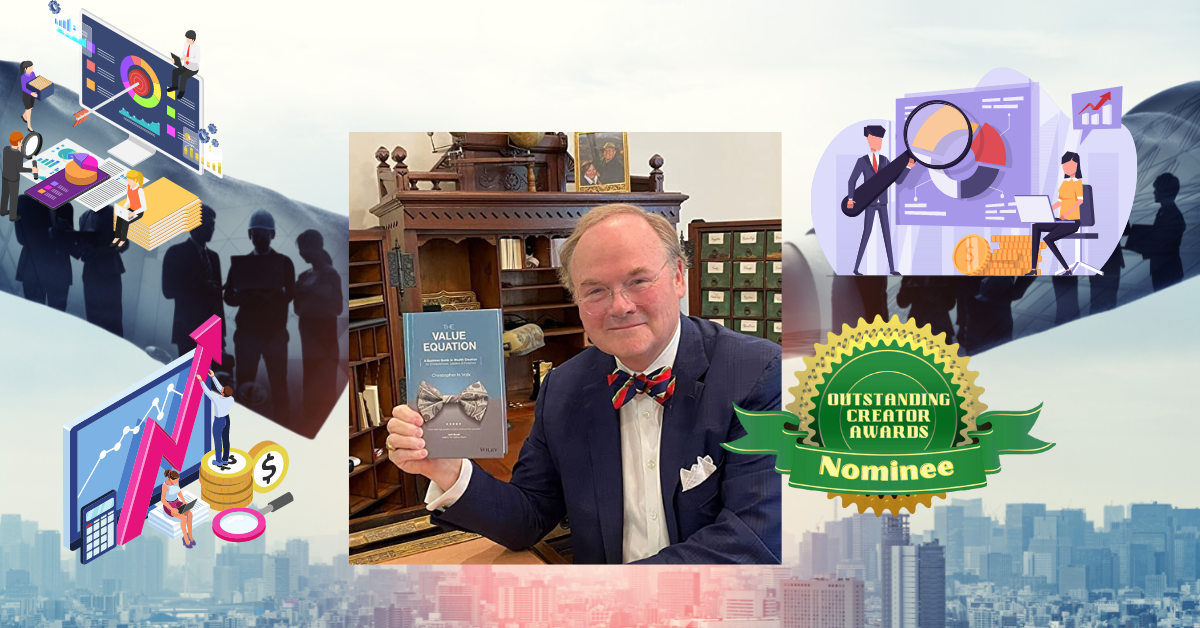|
Score: 96/100 (9.6 out of 10)
It was an honor and a privilege to reread The Value Equation by the phenomenal Christopher H. Volk, a businessman who has walked the talk and succeeded against all odds. He went from humble beginnings taking night classes just to get his MBA and rose to become the co-founder, president, and CEO of STORE Capital Corporation, a corporation valued at 11.4 billion dollars. You heard that right. The real-estate corporation that Volk co-founded is worth over $11,000,000,000! So, he knows what he's talking about! Do you want to know the strangest thing? We actually didn't know who he was the first time we read this book, yet he wowed us then and continues to wow us now. It's like an encore presentation! To premise of this book is that the American economic system—the market economy—provides tremendous opportunities for just about anyone to become wealthy. We live in a time of tremendous prosperity. Going off rote memory from the book, there are nearly 1,000 billionaires in this country! One point that the author continuously makes is that a whopping 60% of those billionaires are self-made. That means that they weren't born rich—they became rich through their own efforts, imagination, and possibly some luck. But controlling the controllables (like effort, innovation, and value creation), can set you up for great things. These are concepts and ideas that really appeal to us as creators and business owners. Volk speaks our “language!” The author reminds us that prospering as a business means creating and delivering value to customers/clients who then continue to buy. This is largely what we do through Outstanding Creator Awards. Editorial reviews like this normally cost a lot. Also, to be frank, they're usually not that good or not that thorough. We include it with every entry. Even our entry fee is relatively low compared to other contests, many of which offer less. So, we've created and deliver value to the people who come to us. We take care of them, they take care of us. The author also emphasizes that you want to ensure that your business actually is profitable and that your investments actually are delivering returns. This book is one that we'd consider an “encyclopedia of business.” It is rich with information, incredibly packed into only 208 double-spaced pages! That's incredible! However, with all its information, it's really the stories in here that we loved the most. There's a story in here about how Daymond John took his little garage clothing business (FUBU) and made it enormously successful. By the way, you might recognize Daymond John from Shark Tank like we did! There's a huge discussion about the Waltons and how their Walmart business became so successful. There's also the issue of big businesses like Walmart continuing to be successful in light of challenges like the rise of online alternatives and world-changing events like we saw in 2019-2021. Did you know that Walmart closed about 300 stores in 2016? We didn't. But we knew that other retail businesses like Sears & Target faced big problems (and mostly closed). What's phenomenal about Walmart is that they continued to thrive and adapt. Adaptation is one of the keys the author talks about. A businesses like Blockbuster and Kodak failed to adapt, and look where they are now. A company like Apple, on the other hand, innovates and adapts seemingly every year, pouring millions into research & development. There's another really interesting story in here about Google (Alphabet). Apparently, the founders had been offered $750K to sell it to a larger search engine called Excite. Could you imagine if they'd done that? Could you imagine if they were just content and gave up their multi-billion-dollar IP? That reminds us of what Mark Callaway (The Undertaker) said at the end of his epic Hall of Fame speech: “Never be content.” That might rub people the wrong way, but there's some power and truth to that. The people with the most success and the most longevity are the ones who keep adapting and getting better instead of accepting being average, mediocre, or “good enough.” Look at Google (Alphabet) itself. It became this big, huge search engine, yet it branched out to acquire YouTube—something that was also big, huge, and lucrative. The same came be said for Facebook (Meta) and Instagram, as the author points out. If you're in business, you can't go without reading this book. It's a must! Check it out on Amazon!
0 Comments
Leave a Reply. |
Archives
July 2024
Categories |

 RSS Feed
RSS Feed